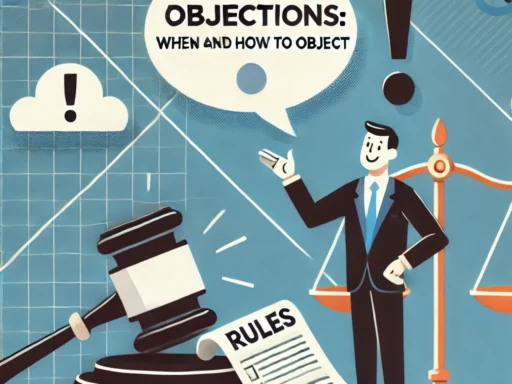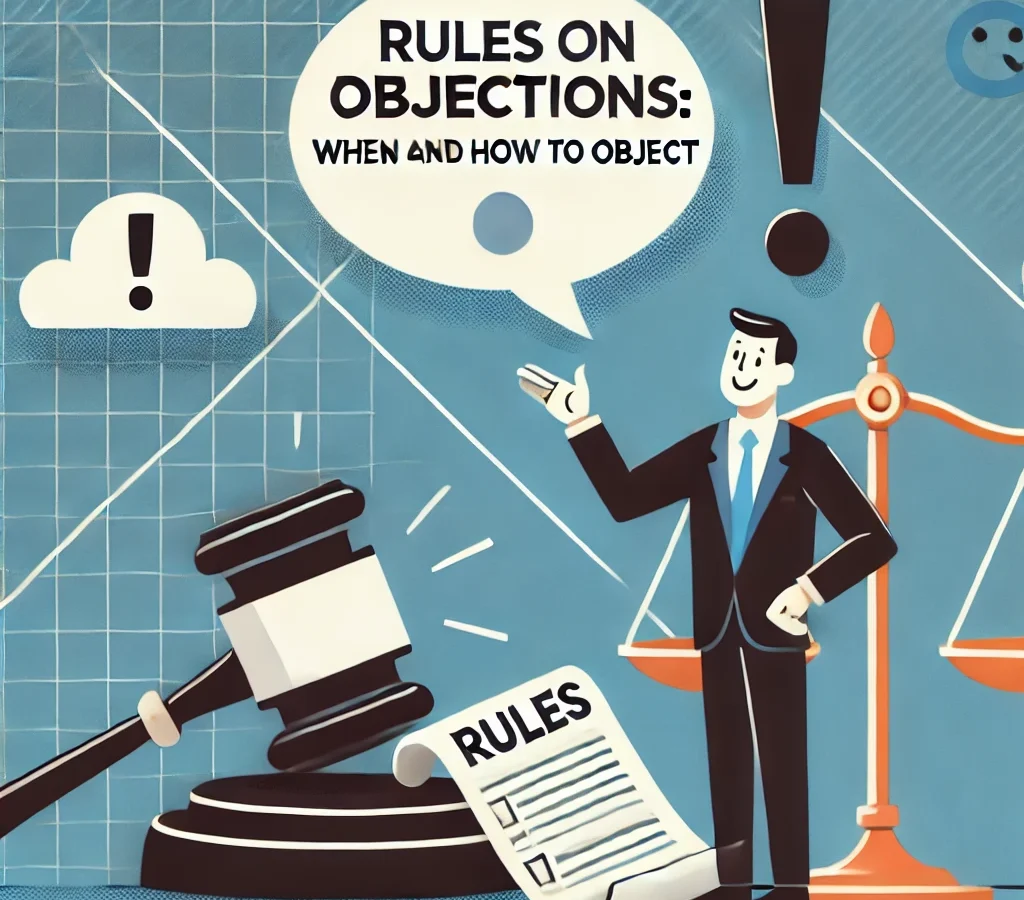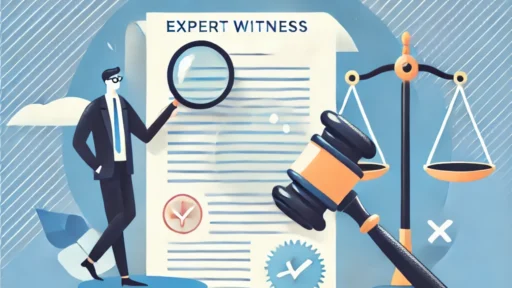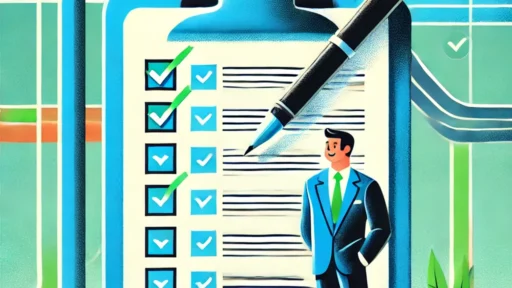Navigating a deposition can be a daunting task, especially when it comes to understanding when and how to make objections. These objections play a critical role in protecting a client’s rights and ensuring that the deposition process remains fair and just. Knowing the rules and strategies for objecting effectively can make a significant difference in the outcome of a case.
This article delves into the essential rules on objections during a deposition preparation checklist. It covers the types of objections that can be made, the appropriate timing for raising them, and the specific language to use. By mastering these aspects, legal professionals can better advocate for their clients and maintain the integrity of the deposition preparation process.
Understanding Deposition Objections
During a deposition, attorneys have the right to object to questions or answers that violate procedural rules or could prejudice their client’s case. Objections aim to ensure that the deposition proceeds fairly and that the testimony deposition obtained is admissible in court.
Common Types of Objections
During a deposition exhibit, attorneys use various objections to ensure a fair legal process. They address specific issues within the questioning process to maintain clarity and adherence to legal standards.
Relevance
Attorneys object to questions that do not pertain to the case’s subject matter. They argue that irrelevant questions waste time and distract from the core issues. For example, asking about personal matters unrelated to the case can lead to a relevance objection. By objecting on relevance grounds, attorneys ensure only pertinent information becomes part of the official record.
Form of the Question
Objections regarding the form of a question address how a question is phrased. Questions can be leading, vague, compound, or argumentative. For instance, a question such as, “You were speeding and not paying attention, weren’t you?” combines multiple assertions and can confuse the deponent. These objections highlight improper phrasing to ensure questions adhere to procedural rules.
Privilege
Privilege objections protect confidential communication between a client and their attorney. When a question seeks information covered by attorney-client privilege, the tips attorney objects to prevent disclosure. For instance, if opposing counsel asks about discussions directly with legal counsel, a privilege objection ensures those confidential communications remain protected. These objections preserve the confidentiality lawyer and the integrity of privileged interactions.
Harassment or Intimidation
Attorneys object to depositions questions that are harassing or intimidatory to the deponent. Questions intended to embarrass or unduly pressure the cooperating witness fall into this category. An attorney might object if questioning becomes aggressive attorneys or overly repetitive, such as persistently asking about sensitive personal topics. By objecting, attorneys protect the witness management from unfair treatment and ensure a respectful deposition advice environment.
Specific Language for Objections
Using precise language when objecting is vital. Common phrases include:
- “Objection, leading.”
- “Objection, compound.”
- “Objection, vague.”
- “Objection, privilege.”
Clarity and brevity in stating objections help maintain the deposition preparation’s flow while clearly noting the basis of the objection for the record.
Protecting Client’s Rights
Effective objections safeguard the client’s interests by ensuring that only relevant, non-prejudicial, and legally permissible information is included in the video conference deposition. They prevent improper questioning and preserve crucial rights for future court proceedings.
This understanding of deposition objections equips legal professionals with the knowledge needed to navigate this essential part of the legal process confidently.
When to Object
Attorneys must know when to object during depositions to protect their client’s interests and maintain the integrity of the proceedings. Proper timing ensures that objections are effective and relevant to the case of how to handle a deposition.
Timing Considerations
Objecting at the right moment can make a crucial difference in a deposition lawsuit. Attorneys should object immediately if a question is inappropriate, ensuring the objection is recorded. Delayed objections may lead to waiving the right to challenge the testimony later.
Timely objections prevent improper information from becoming part of the record, which can affect the overall case outcome.
Strategic Use of Objections
Using objections strategically helps attorneys control the deposition’s flow and protect their clients. An attorney might object to a question’s form, such as if it’s leading or vague, to make sure it’s rephrased clearly.
Objections on the grounds of privilege protect sensitive communications, while relevance objections ensure only pertinent information is discussed. By carefully choosing when and what objections to raise, attorneys can strengthen their client’s position and influence the deposition’s direction productively.
How to Object Effectively
Objecting effectively during a deposition is crucial to ensure objections are timely and appropriate, preserving the deposition’s procedural integrity. Mastering how to verbalize and avoid argumentative objections helps maintain a clear and respectful deposition record.
Verbalizing the Objection
Clear articulation forms the crux of effective objections. The attorney must state the objection concisely, using specific legal bases like “objection, relevance” or “objection, privilege.” This clarity ensures the court reporter accurately records the objection, and any potential reviewing court comprehends the basis. Avoid long-winded explanations to prevent unnecessary disruptions.
Avoiding Argumentative Objections
Argumentative objections often derail deposition flow and create conflict. Rather than debating the question’s merits, the attorney should state simple objections without elaboration. For instance, saying “objection, form” helps avoid disputes while preserving the right to explain further during trial. Effective objections prevent exacerbating tensions and maintain professional decorum.
Objecting effectively during depositions, by verbalizing specifically and avoiding arguments, helps uphold the procedure’s integrity.
Legal Consequences of Improper Objections
Improper objections during depositions can have significant legal repercussions. These consequences can affect the deposition’s outcome and potentially compromise a case’s integrity.
Sanctions and Penalties
Courts may impose sanctions for improper objections, including monetary fines and adverse rulings. Rule 30(d)(2) of the Federal Rules of Civil Procedure authorizes courts to penalize parties who impede or delay the deposition process. Repeated improper objections can lead to harsher penalties, potentially impacting the overall case deposition strategy.
Risk to Case Integrity
Improper objections risk the integrity of the case by introducing unmerited disputes that detract from substantive issues. They can disrupt the flow of the deposition, making the process inefficient and confusing. If an attorney consistently makes improper objections, the judge might view it as a tactic to frustrate the discovery process. This perception can harm the client’s position, resulting in unfavorable rulings or even dismissal of valid arguments.
Strengthen Your Legal Practice with BlueNotary’s Secure Notarization Services
Mastering the rules on objections is crucial for effective depositions. Complement your legal expert witness deposition with BlueNotary’s advanced online notarization platform, ensuring all your deposition documents are authenticated and legally binding.
Enhance your legal proceedings with reliable notarization solutions. Discover how BlueNotary can support your practice with secure and efficient services. Visit our website today to learn more about protecting your legal documents and maintaining the integrity of your depositions.
Frequently Asked Questions About Objections in Depositions
Q1. What are the common types of objections in depositions?
Common objections include relevance, hearsay, leading questions, privilege, and form. Each type of objection serves to address different concerns about the questions being asked.
Q2. When should an attorney object during a deposition?
An attorney should object when a question is improper, irrelevant, or violates legal standards. Objections can help prevent the introduction of inadmissible evidence and protect the witness from answering inappropriate questions.
Q3. How should objections be phrased during a deposition?
Objections should be clear and concise, stating the specific ground for the objection. For example, an attorney might say, “Objection, hearsay,” or “Objection, leading.”
Q4. What happens after an objection is made during a deposition?
After an objection is made, the attorney asking the question may rephrase it or argue the objection’s validity. The court reporter records the objection, and the deposition continues, with the objection noted for potential court review.
Q5. Can a witness refuse to answer a question after an objection?
A witness can refuse to answer a question if the objection is based on privilege or if instructed by their attorney. Otherwise, the witness typically answers, and the objection is noted for the record.








